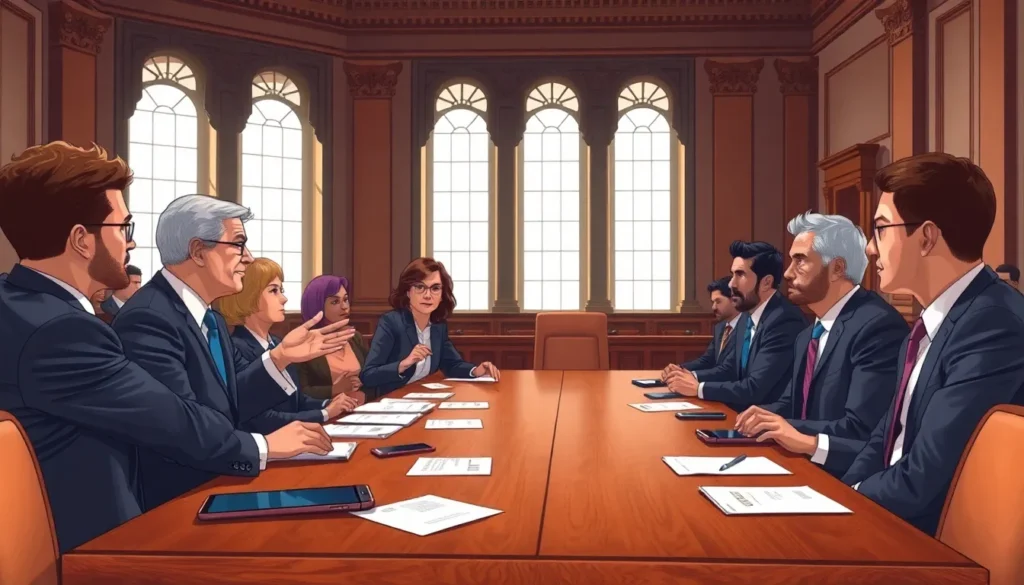Public policy careers might sound like a snooze-fest to some, but they’re anything but boring. Imagine being the mastermind behind laws that can change lives, tackle climate change, or even improve local schools. If you’ve ever wanted to play superhero without the spandex, this field is your cape.
From shaping legislation to analyzing data, public policy professionals wear many hats—sometimes literally. They’re the ones who turn ideas into action, ensuring that the voices of the community are heard loud and clear. With a growing demand for skilled individuals in this arena, now’s the perfect time to dive in. Who knew making a difference could be this exciting?
Table of Contents
ToggleOverview of Public Policy Careers
Public policy careers encompass a wide range of roles that influence societal change. Professionals in this field work on crucial issues like healthcare, environmental protection, and education reform. They engage in research, conduct analysis, and develop strategies to address complex problems.
Policy analysts focus on gathering data, evaluating existing policies, and recommending improvements. Lobbyists advocate for specific interests, presenting arguments to lawmakers to sway legislative decisions. Public affairs specialists communicate policy objectives to the public and stakeholders, often improving transparency and understanding.
Additionally, government relations managers build relationships between organizations and government entities. They navigate regulatory environments, ensuring compliance while promoting organizational goals. Legislative aides support elected officials by preparing briefs, conducting policy research, and managing constituent inquiries.
These careers often require strong analytical skills, effective communication, and a commitment to public service. Individuals frequently pursue advanced degrees in public policy, political science, or related fields, enhancing their expertise and marketability.
Job growth in public policy continues to rise, driven by the demand for skilled professionals to navigate complex societal challenges. Organizations like non-profits, think tanks, and government agencies actively seek individuals who can contribute to policy development and implementation.
A variety of opportunities also exist at international levels, where professionals address global challenges like climate change and poverty. This expansive field offers numerous pathways for those motivated by making a difference.
Key Skills Required
Public policy careers demand a variety of key skills essential for success in this field. Mastery of these skills enhances effectiveness in various roles, contributing to impactful policy development and analysis.
Analytical Skills
Analytical skills rank high among the necessary competencies for public policy professionals. Individuals must evaluate complex data effectively, identifying trends and patterns that inform policy decisions. Critical thinking enables them to assess the implications of different policy options. Knowledge of statistical methods and research techniques also proves beneficial. Data-driven insights support effective advocacy and help shape compelling arguments. Policy analysts often draw on these skills to propose feasible recommendations, ensuring policies are well-founded and actionable.
Communication Skills
Communication skills are vital in public policy careers. Professionals must convey complex ideas clearly and persuasively to diverse audiences. Writing skills significantly contribute to developing reports, briefs, and policy documents that resonate with stakeholders. Oral communication abilities facilitate effective presentations and discussions in public forums. Persuasion becomes essential when advocating for specific initiatives or policy changes. Strong interpersonal skills foster collaboration and relationship-building with various stakeholders, including government officials, community leaders, and the public.
Leadership Skills
Leadership skills are crucial for those seeking to influence public policy. Professionals often find themselves guiding teams, directing projects, and driving change within organizations. Effective leaders cultivate a vision for policy initiatives, inspiring others to work towards common goals. Strategic thinking enables them to navigate political landscapes and manage competing interests effectively. Decision-making abilities play an important role when assessing the long-term impacts of policies. With solid leadership skills, public policy professionals can foster teamwork and collaboration, further enhancing their impact within the field.
Educational Pathways
Educational pathways in public policy provide crucial foundations for aspiring professionals. Pursuing relevant degrees equips individuals with the knowledge and skills necessary for effective policy analysis and development.
Relevant Degrees
A bachelor’s degree often serves as the starting point for many in the public policy field. Common disciplines include political science, economics, public administration, and international relations. Graduate programs, such as Master of Public Policy (MPP) or Master of Public Administration (MPA), enhance expertise and analytical capabilities further. Programs focus on quantitative methods, policy evaluation, and ethical considerations, which are critical for addressing societal challenges. Specialized degrees, such as those in environmental policy or health policy, offer tailored training for specific sectors, increasing employability in targeted roles.
Certifications and Training
Certifications play an important role in advancing careers in public policy. Relevant certifications include the Certified Public Manager (CPM) and the Project Management Professional (PMP). These indicate proficiency in managing public projects and enhancing leadership skills. Additionally, training programs on data analysis tools and policy evaluation methods sharpen expertise and readiness. Workshops, seminars, and online courses provide opportunities for continuous learning, keeping professionals updated on emerging trends and best practices. Building a strong skill set through these certifications and training enhances career prospects and effectiveness in public service roles.
Career Opportunities in Public Policy
Public policy careers offer a variety of pathways across sectors, providing professionals with numerous opportunities to influence societal change. The following sections highlight specific career options available within government, non-profit organizations, and the private sector.
Government Positions
Government roles in public policy encompass a range of positions at local, state, and federal levels. Policy analysts assess policies and evaluate their impacts on communities. Legislative aides support lawmakers in developing and implementing new legislation. Public affairs specialists manage communication strategies to engage the public and media. With increasing demand for transparency, professionals in these positions play essential roles in shaping effective governance and public administration.
Nonprofit Organizations
Nonprofit organizations offer unique public policy career opportunities focused on advocacy, research, and community engagement. Policy advocates work to influence legislation by mobilizing grassroots support and presenting data on key issues. Research analysts gather and analyze data to inform policy decisions, ensuring that organizational objectives align with community needs. Fundraising specialists seek resources to support various initiatives, driving change in areas like education, healthcare, and environmental protection. These roles foster collaboration and aim to create sustainable solutions for societal challenges.
Private Sector Roles
Private sector positions contribute significantly to public policy by focusing on corporate social responsibility and advocacy. Government relations managers collaborate with lawmakers to represent business interests and facilitate partnerships. Policy consultants provide expert analysis and recommendations, enabling organizations to navigate complex regulatory environments. Additionally, lobbyists advocate for specific policies that align with a company’s goals. These roles emphasize the importance of stakeholder engagement and strategic communication in influencing policy outcomes.
Challenges in Public Policy Careers
Public policy careers present unique challenges that professionals must navigate. Individuals often face significant competition in the job market and deal with issues related to work-life balance.
Job Market Competition
Competition remains fierce in the public policy job market. Many candidates hold advanced degrees and relevant experience, intensifying the contest for roles like policy analysts and legislative aides. Positions in prestigious organizations attract numerous applicants, making it crucial to distinguish oneself through internships or networking. Additionally, candidates must showcase strong analytical and communication skills, as these attributes remain pivotal in policy development. Leading organizations frequently prioritize skills that align with current societal issues, such as climate change and healthcare reform.
Work-Life Balance
Work-life balance poses another challenge within public policy careers. Professionals often confront demanding schedules due to tight deadlines and high-stakes projects. Long hours can be common during legislative sessions or major policy initiatives, posing risks to personal well-being. Additionally, job demands may require travel, especially in roles that involve advocacy or stakeholder engagement. Managing stress becomes essential, as burnout can impact performance and overall job satisfaction. Professionals must develop effective strategies to maintain a healthy separation between work and personal life, ensuring sustained effectiveness in their roles.
Public policy careers offer a unique opportunity to drive meaningful change in society. With a growing demand for skilled professionals across various sectors it’s clear that this field is ripe with potential. Those who embrace the challenges and rewards of public policy can significantly impact areas like healthcare education and environmental protection.
Equipped with strong analytical and communication skills individuals can navigate complex policy landscapes and advocate for the greater good. As they pursue this rewarding path they’ll find that their efforts contribute not only to their personal growth but also to the betterment of communities and society as a whole.


